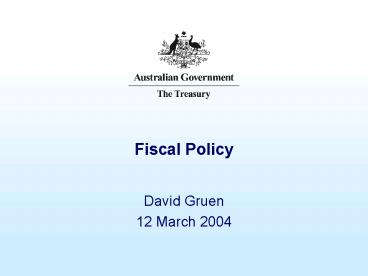Fiscal Policy - PowerPoint PPT Presentation
1 / 32
Title: Fiscal Policy
1
Fiscal Policy
- David Gruen
- 12 March 2004
2
Outline
- Taxes and Government Spending
- Government Budget Constraint
- Fiscal Policy in the Short and Long Run
- Short Run (business cycle)
- Automatic Stabilisers
- Debate about active discretionary fiscal policy
- Long Run
- Fiscal Sustainability
- Charter of Budget Honesty
- Intergenerational Report
3
Taxes and Government SpendingSources of Revenue
4
Taxes and Government SpendingSpending By
Function
5
Government Budget Constraint
- When government spending exceeds tax collections,
governments can - Print money
- And what is the implication of that?
- Or issue bonds
- What is a government bond?
6
Commonwealth Government Spending and Revenue
7
Net Debt and Net Interest
8
(No Transcript)
9
Interest rates on Australian government
bondsthe yield curve on 9 March 2004
10
Budget Balances
11
Fiscal Policy in the Short and Long Run
12
Fiscal Policy in the Short Run
- Automatic Stabilisers
13
(No Transcript)
14
Fiscal Policy in the Short Run
- Automatic Stabilisers
- Debate about active discretionary fiscal policy
15
Debate about active discretionary fiscal policy
- I will take as given that recessions are bad, and
to be avoided, or reduced in magnitude, if
possible because of lack of insurance markets for
unemployment etc., (presuming that cost of
reducing size of recessions is not too high) - Monetary policy plays main counter-cyclical role
16
Debate about active discretionary fiscal policy
- Arguments for discretionary fiscal policy
- Monetary policy and the automatic stabilisers
together dont provide enough stimulus
recessions can still be quite deep (eg, US in
2001) - Zero bound on interest rates? probably not a
problem for Australia - Transmission Lags Some types of fiscal policy
(which ones? cf tax cuts in US) can probably
raise economic activity faster than changes to
monetary policy
17
Debate about active discretionary fiscal policy
- Arguments against discretionary fiscal policy
- Fiscal institutions not well set up for
discretionary responses to recessions or booms - Could change the institutional structure have a
fiscal authority independent of government with
(limited) fiscal powers Business Council of
Australia - Implementation lags designing fiscal changes,
and getting them passed through Parliament is
the recession over by the time the fiscal changes
come into effect? - Ready shelf of projects?
18
Debate about active discretionary fiscal policy
- Arguments against discretionary fiscal policy
(cont) - Easier to raise govt. spending and/or cut taxes
than to reverse these changes a series of short
runs leading to a long run problem
19
Fiscal Policy in the Long Run
20
(No Transcript)
21
What is an appropriate level of government debt?
- Good question
- No international consensus (0 of GDP? or 20 or
40) in contrast to broad consensus that
monetary policy should maintain a low positive
rate of inflation - Longer-term issues ageing and rising health
costs (will return to these) - High levels of government debt/deficits
- lead to higher interest rates
- crowd out private investment
22
Interest Rate Effectsof Government Debt
- A 10 percentage point rise in the
government-debt-to-GDP ratio leads to a rise of
about 0.4 per cent in the interest rate on
government bonds - New Evidence on the Interest Rate Effects of
Budget Deficits and Debt, Thomas Laubach,
Finance and Economics Discussion Paper 2003-12,
Board of Governors of the Federal Reserve System
23
(No Transcript)
24
Fiscal Policy in the Long Run
- Since the mid 1980s, the large Australian
- current account deficit (which has averaged
about 4½ percent of GDP for the past two decades)
has provided a strong motivation for governments
to run close-to-balanced budgets, so as not to
contribute to the current account deficit.
25
Commonwealth Govt. Fiscal Strategy
- Primary objective
- maintain the budget balance, on average, over the
course of the economic cycle. - Supplementary objectives
- maintaining surpluses over the forward estimates
period while economic prospects remain sound, - no increase in overall tax burden from 1996-97
levels, and - improving Commonwealth governments net worth
over the medium to longer term
26
Charter of Budget Honesty
- The Charter of Budget Honesty Act (1998) compels
the Government to - publish a fiscal strategy and report against it,
- publish a Mid-Year Economic and Fiscal Outlook
(MYEFO) each year, - publish an Intergenerational Report at least
every 5 years, and - Publish a Pre-Election Fiscal and Economic
Outlook and cost election policies on request
before elections
27
2002-03 Intergenerational Report (IGR)
28
Underlying Cash Budget BalanceBased on IGR
Primary surplus/deficit shown (no allowance for
debt dynamics)
29
Net Debtunderlying cash balances from IGRreal
interest rate, 4p.a.
30
Underlying Cash Budget BalanceBased on IGR
Primary surplus/deficit shown (no allowance for
debt dynamics)
31
Underlying Cash Budget BalanceBased on IGR
Primary surplus/deficit shown (no allowance for
debt dynamics)
32
Projected rise in Commonwealth health
expenditures from 2003-04based on IGR
Per cent of GDP
Per cent of GDP
4.5
4.5
4.0
4.0
3.5
3.5
3.0
3.0
2.5
2.5
2.0
2.0
1.5
1.5
1.0
1.0
0.5
0.5
0.0
0.0
2003-04
2013-14
2023-24
2033-34
Total































